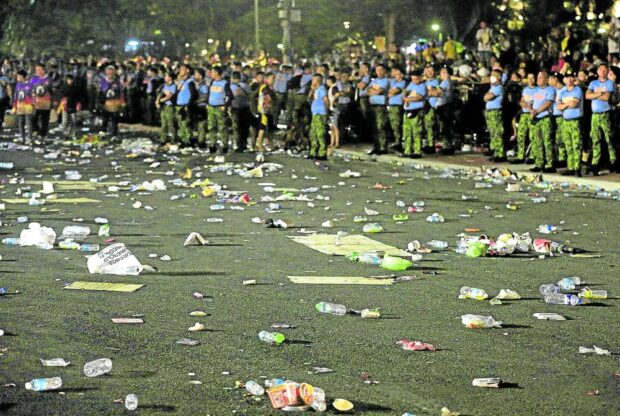‘Traslacion’ leaves 468 metric tons of garbage

‘TRASHLACION’ | Trash litters the grounds of Rizal Park after millions of devotees leave Quirino Grandstand to join the “traslacion” or grand procession of the Black Nazarene to Quiapo Church. (Photo by RICHARD A. REYES / Philippine Daily Inquirer)
MANILA, Philippines — The celebration of the Feast of the Black Nazarene in Manila from Jan. 6 to 10 left behind a staggering 468 metric tons of garbage.
A report from the Manila City government’s Department of Public Services (DPS) released on Wednesday said that the amount of trash collected for the four-day festivities was equivalent to 158 truckloads.
Princess Abante, the spokesperson of Manila Mayor Honey Lacuna-Pangan, said that on Jan. 9 alone, the day of the “traslacion,” the procession of the image of the Black Nazarene from Quirino Grandstand in Rizal Park to Quiapo Church, which took a total of 15 hours, a total of 128 metric tons of trash were collected, enough to fill 46 trucks.
In January 2020, two months before the government announced the first lockdown due to the pandemic, a total of 394 metric tons were collected after the procession. The event was canceled from 2021 until last year to prevent the spread of COVID-19. This year, an estimated 6.5 million devotees joined the translation, but the environmental group Ecowaste Coalition lamented that the accumulated garbage seemed to indicate “a lack of respect for fellow humans and Mother Nature.”
Elusive dream
“The devotion and sacrifice shown by the devotees of the Dear Lord Nazarene [are] amazing. Indeed, their burning faith never fades,” Ochie Tolentino, the advocate for the group’s zero waste campaign, said in a statement. “A clean traslacion remains elusive.”
In Rizal Park, which served as the venue for the traditional “pahalik” vigil and “Misa Mayor” led by Manila Archbishop Jose Cardinal Advincula, the parade grounds and adjacent streets were strewn with garbage collected by personnel from Manila City Hall, Metropolitan Manila Development Authority and volunteers from Ecowaste Coalition and the Samahan ng mga Mangangalakal sa Capulong from Tondo, Manila.
Most of the discarded items were single-use plastic bags, bottles, cups, cutlery and plates, as well as nonbiodegradable polystyrene food containers, fast-food paper packaging, leftovers, soiled diapers, improvised sleeping materials, cigarette butts and disposable vapes, despite the park’s no-smoking policy.
In the Quiapo area, Ecowaste Coalition said that DPS personnel had to “untiringly” pick up the waste left by devotees, including plastic water bottles, plastic and paper food containers, and leftover food.
“If not collected, these [plastic] bottles would have ended up in landfills or storm drains and esteros, aggravating the risk of flooding in the City of Manila and worsen[ing] plastic and microplastic pollution in Manila Bay and elsewhere,” Tolentino said.
Aside from the hard work of government staff, the Green Brigade Team of Quiapo Church, and volunteers from the private sector, the group also cited the waste pickers, many of them unorganized, who collected the discarded plastic bottles to sell to junk shops.
Despite the “disappointing” results this year, the Ecowaste Coalition expressed confidence that the situation would improve in the coming years.